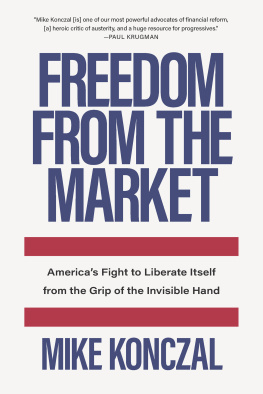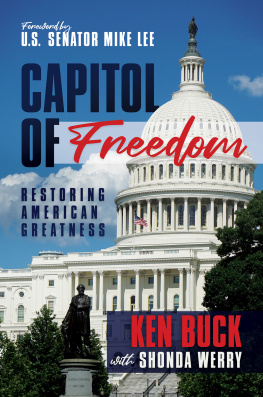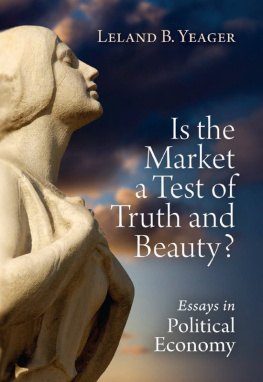Mike Konczal - Freedom from the Market: America’s Fight to Liberate Itself from the Grip of the Invisible Hand
Here you can read online Mike Konczal - Freedom from the Market: America’s Fight to Liberate Itself from the Grip of the Invisible Hand full text of the book (entire story) in english for free. Download pdf and epub, get meaning, cover and reviews about this ebook. year: 2021, publisher: The New Press, genre: Politics. Description of the work, (preface) as well as reviews are available. Best literature library LitArk.com created for fans of good reading and offers a wide selection of genres:
Romance novel
Science fiction
Adventure
Detective
Science
History
Home and family
Prose
Art
Politics
Computer
Non-fiction
Religion
Business
Children
Humor
Choose a favorite category and find really read worthwhile books. Enjoy immersion in the world of imagination, feel the emotions of the characters or learn something new for yourself, make an fascinating discovery.
- Book:Freedom from the Market: America’s Fight to Liberate Itself from the Grip of the Invisible Hand
- Author:
- Publisher:The New Press
- Genre:
- Year:2021
- Rating:5 / 5
- Favourites:Add to favourites
- Your mark:
Freedom from the Market: America’s Fight to Liberate Itself from the Grip of the Invisible Hand: summary, description and annotation
We offer to read an annotation, description, summary or preface (depends on what the author of the book "Freedom from the Market: America’s Fight to Liberate Itself from the Grip of the Invisible Hand" wrote himself). If you haven't found the necessary information about the book — write in the comments, we will try to find it.
Mike Konczal [is] one of our most powerful advocates of financial reform, [a] heroic critic of austerity, and a huge resource for progressives. Paul Krugman
Health insurance, student loan debt, retirement savings, child care, work-life balance, access to home ownershipthese are the issues driving Americas current political debates. And they are all linked, as this brilliant and timely book reveals, by a single question: should we allow the free market to determine our lives?
In the tradition of Naomi Kleins Shock Doctrine, noted economic commentator Mike Konczal answers this question with a resounding no. Freedom from the Market blends passionate political argument and a bold new take on American history to reveal that, from the earliest days of the republic, Americans have defined freedom as what we keep free from the control of the market. With chapters on the history of Homestead Act and land ownership, the eight-hour work day and free time, social insurance and Social Security, World War II day cares, Medicare and desegregation, free public colleges, intellectual property, and the public corporation, Konczal shows how citizens have fought to ensure that everyone has access to the conditions that make us free.
At a time when millions of Americansand more and more politiciansare questioning the unregulated free market as un-American, Freedom from the Market offers a new narrative, and new intellectual ammunition, for the fight that lies ahead.
Mike Konczal: author's other books
Who wrote Freedom from the Market: America’s Fight to Liberate Itself from the Grip of the Invisible Hand? Find out the surname, the name of the author of the book and a list of all author's works by series.








